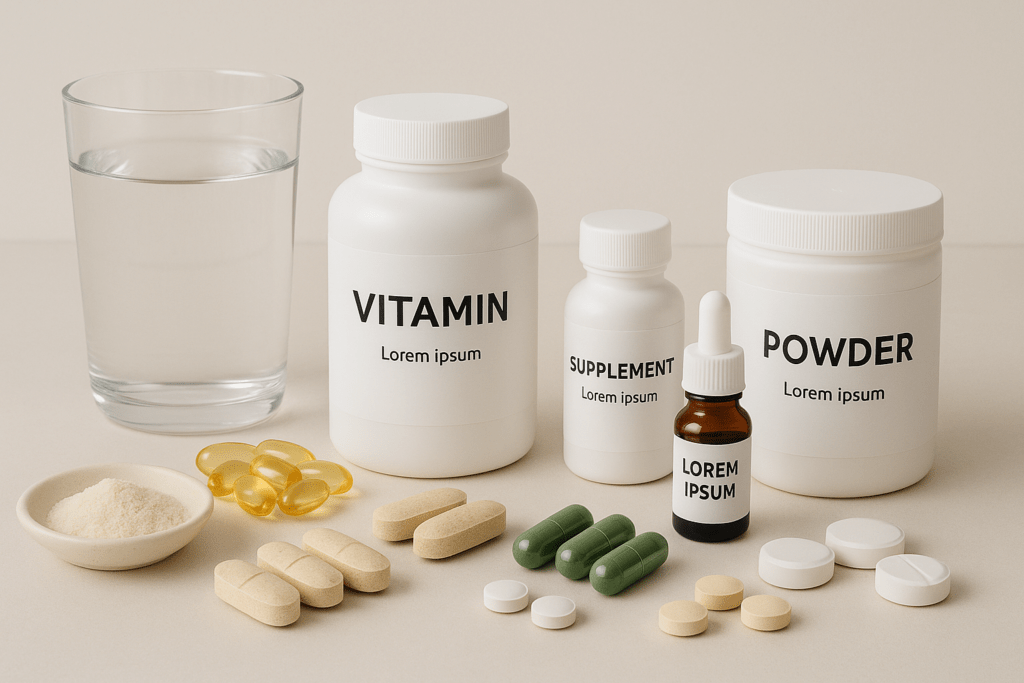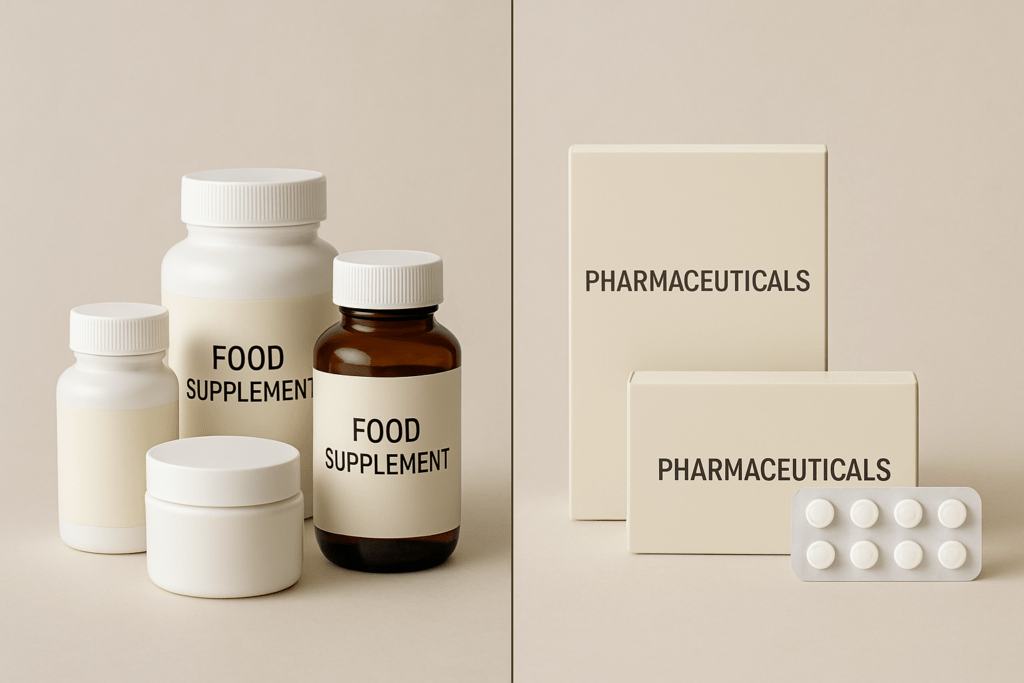In today’s fast-paced world, where the pace of life is extremely fast and nutrition is not always balanced, dietary supplements have become a regular part of many people’s daily lives. Although a wide variety of dietary supplements can be found in supermarkets and pharmacies, not everyone knows exactly what they are and when they are really worth taking. The topic of dietary supplements is shrouded in many myths and contradictory information – some believe in their miraculous properties, while others doubt their benefits and safety.
In this article, we will take a detailed look at what dietary supplements are, in which cases they can be useful, what their possible side effects are, and how to choose a quality product. You will learn how to distinguish when supplements are really necessary and when it is better to rely on a complete diet. The information provided in the article will help you make informed decisions about the use of vitamins and minerals and the supplementation of other nutrients.
What are dietary supplements?
Food supplements are food products intended to supplement the usual diet, constituting a concentrated source of nutrients or other substances with a nutritional or physiological effect. They are manufactured and sold in capsules, tablets, pills, liquids, powders and other forms that allow the consumption of precisely dosed amounts of active substances.

According to the legislation of the European Union and Lithuania, food supplements are classified as food products, not medicines, therefore they are subject to less stringent testing and registration requirements. Supplements usually contain vitamins, minerals, amino acids, herbal extracts, fatty acids, enzymes, prebiotics and probiotics, and other biologically active substances.
Food supplements can be of natural or synthetic origin. Natural supplements are made from plant or animal raw materials, while synthetic ones are made in laboratories using chemical processes. Although many people tend to believe that natural products are always better, scientific research does not confirm this – the most important thing is the bioavailability of the substance and its suitability for a specific organism.
Food supplements and medicines: what is the difference?
One of the most common mistakes is the identification of food supplements with medicines. Although they may sometimes look similar (especially when packaged in tablets or capsules), there are fundamental differences between them:

- medicines are intended for the treatment or prevention of diseases, while supplements are intended to supplement nutrition
- medicines undergo extensive clinical trials before being marketed, while dietary supplements are not subject to such strict requirements
- medicines must prove their effectiveness and safety, while supplements only need to prove that they are not harmful
- the composition of medicines is strictly controlled, while the quality and composition of supplements can vary more
- medicines usually have clear instructions for use and dosage for specific conditions, while recommendations for the use of supplements are often more general
It is important to understand that dietary supplements cannot replace medicines if a person has been diagnosed with a disease. They cannot be advertised as having healing or disease-preventing properties – such claims are only allowed when referring to medicines.
Why do we need food supplements?
Ideally, a person should get all the necessary nutrients from a varied and balanced diet. However, in reality, this is not always possible for various reasons: the pace of modern life, eating habits, food quality, health status or increased need for certain substances.
Food supplements can be useful to fill nutritional gaps and ensure that the body receives all the substances it needs.

According to scientific research, deficiencies in some vitamins and minerals can be linked to a variety of health problems, from general fatigue to more serious illnesses.
It is important to note that taking supplements should be based on real need, not just to “protect yourself.” Before starting any supplements, it is recommended to consult a doctor or nutritionist who can assess your individual needs and indicate what substances your body is lacking.

In addition to purchasing appropriate supplements, you can also get professional advice from a pharmacy.
Who benefits most from dietary supplements?
Some groups of people may find supplements particularly beneficial:

- vegetarians and vegans – due to possible deficiency of vitamin B12, iron, calcium, zinc and omega-3 fatty acids
- pregnant women and women planning pregnancy – folates and other substances are important for fetal development
- older people – due to naturally reduced absorption of nutrients
- athletes and those who exercise actively – due to increased need for energy and muscle recovery
people with digestive disorders or malabsorption syndrome problems - people with chronic diseases that affect food absorption
- people experiencing severe physical or psychological stress
people who cannot consume certain foods due to allergies or intolerance - people living in regions where it is difficult to obtain a complete and varied diet
It is also worth paying attention to seasonality – for example, during the cold season, many people lack vitamin D, which the body produces in the warm season when exposed to sunlight. Therefore, it may be useful to take this vitamin additionally in winter.
Benefits and Side Effects of Dietary Supplements
Properly selected and used, dietary supplements can provide various benefits to the body.

However, like any other substance that enters the body, they can also have side effects, especially if used improperly.
Scientifically proven benefits include:
- prevention and correction of nutrient deficiencies
- strengthening the immune system (e.g. vitamin C, zinc)
- strengthening bones (calcium, vitamin D, magnesium)
- supporting the cardiovascular system (omega-3 fatty acids)
- improving brain function (B vitamins, omega-3)
- improving skin, hair and nail condition (biotin, silicon, zinc)
- improving athletic performance and muscle recovery (BCAA, protein supplements)
- relief of menopausal symptoms (phytoestrogens)
- optimizing digestive system functions (probiotics, prebiotics)
However, let’s not forget that dietary supplements are not miracle products, and their benefits are most evident when they are used purposefully and in conjunction with a healthy lifestyle. They should not be used as an excuse for an unhealthy diet or a sedentary lifestyle.
It is also important to be aware that some supplements may interact with medications. For example, St. John’s wort extract may reduce the effectiveness of some medications, and vitamin K may inhibit the action of blood thinners. Therefore, it is important to inform your doctor about all supplements you are taking, especially if you are taking medication. More information about the possible side effects of supplements can be found on specialized health websites.
Known side effects and how to avoid them
While most supplements are safe to take at recommended doses, overdose or improper use can cause adverse reactions:
- Digestive disorders – nausea, abdominal pain, diarrhea (especially with iron, magnesium supplements)
- Allergic reactions – skin rash, itching, swelling
- Headache and dizziness
- Overdose of vitamins (especially fat-soluble vitamins A, D, E, K)
- Liver and kidney damage (due to certain herbal extracts or overdose)
- Increased risk of blood clots (with some supplements)
- Interactions with medications that increase or decrease their effectiveness
To avoid side effects, it is recommended to:
- Take only recommended doses
- Consult
- Inform your doctor about all supplements you are taking before starting medication
- Pay attention to contraindications and warnings on the package
- Monitor your body’s reaction and discontinue use if you notice any adverse symptoms
- Do not take supplements for life without breaks – most of them are recommended to take them in courses
Pregnant women, children, the elderly and people with chronic diseases should pay special attention to the safety of supplements. These groups should only take supplements when recommended by a doctor.
Types and Quality of Supplements: How to Choose?
With so many different supplements on the market, choosing the right one can be a real challenge. To make a successful choice, there are several important aspects to consider.
First of all, it is worth understanding that dietary supplements are divided into several main categories:
- vitamins – important for many body functions (A, group B, C, D, E, K)
- minerals – essential for bones, the nervous system and other functions (calcium, magnesium, iron, zinc, etc.)
- herbal supplements – extracts from plants (ginseng, ginkgo, St. John’s wort, etc.)
- fatty acids – omega-3, omega-6, omega-9
- amino acids and proteins – important for muscle growth and recovery
- probiotics and prebiotics – improving intestinal microflora
- specialized complex supplements – intended for specific groups (athletes, pregnant women, seniors) or specific purposes (joint health, immune system)
When choosing dietary supplements, it is important to consider their quality, composition and the reliability of the manufacturer. The label of quality supplements should clearly indicate the composition, dosage, recommended use and possible contraindications. Reliable manufacturers often provide information about the quality tests performed and adhere to GMP (Good Manufacturing Practice) standards.
It is also worth paying attention to the amount of additional substances (additives) – the best products contain a minimum amount of dyes, preservatives, sweeteners and other synthetic additives. If you have allergies or intolerances to certain substances, be sure to check whether the product does not contain them.
In addition, it is recommended to purchase in trusted specialized stores or pharmacies, where you can also get professional advice.

In online stores, it is worth choosing only reliable sellers with good reviews.
Tips for choosing quality supplements
Here are some tips to help you choose quality food supplements:
- look for products with quality certificates (GMP, ISO, HACCP)
- read labels carefully – quality products have complete and clear information
- pay attention to bioavailability – some forms (e.g. citrate instead of oxide) are better absorbed
- give preference to products without unnecessary additives (dyes, preservatives)
- check whether natural products have quality assurance marks
- in the case of complex supplements, pay attention to whether the components do not interfere with each other’s absorption
- check whether the product is suitable for your diet (e.g. vegetarians, vegans, people with gluten intolerance)
- avoid products that are too cheap – quality often corresponds to the price
- look for information about the manufacturer – does he have a long experience and adheres to quality standards
- consult a health professional who can recommend the most suitable product for you

Remember that the most expensive products are not necessarily the best. The most important thing is that the supplement has the right amount and form of active ingredients, is manufactured in accordance with quality standards, and is suitable for your individual needs.
Summary
Food supplements can be a useful tool in ensuring optimal nutrition and replenishing the body’s nutrient reserves when this cannot be achieved with food alone. However, it is important to remember that they are intended to complement, not replace, a varied and balanced diet.
Before starting to take any supplements, it is recommended to evaluate your diet, lifestyle, and health status, ideally consulting a doctor or nutritionist. Such a specialist can recommend blood tests that will show what substances you are really lacking and help you avoid unnecessary use of supplements.
When choosing supplements, it is important to pay attention to their quality, composition, and the reliability of the manufacturer. When taking supplements, it is necessary to adhere to the recommended doses and monitor the body’s reactions. Remember that an excessive amount of some substances can be no less harmful than their deficiency.
Finally, while supplements can help fill nutritional gaps, they should not be seen as a miracle cure or a way to compensate for unhealthy lifestyle choices. The best investment in health will always be a balanced diet, regular physical activity, adequate rest, and stress management.

Frequently Asked Questions
What are dietary supplements and how do they differ from medicines?
Dietary supplements are products intended to supplement the regular diet, providing a concentrated source of nutrients or other substances. They differ from medicines in that they are not intended to treat or prevent diseases, are less regulated, do not need to prove their effectiveness, only safety, and their composition is not as strictly controlled.
Who is recommended to take dietary supplements?
Dietary supplements are recommended for people with dietary restrictions (e.g. vegetarians), with certain diseases, with increased nutrient needs (pregnant women, the elderly, athletes), or when for other reasons it is impossible to obtain all the necessary substances from food. Before starting to take supplements, it is always recommended to consult a specialist.
Can dietary supplements cause side effects?
Yes, dietary supplements can cause side effects, especially when taken in excessive doses or in inappropriate combinations. They can interact with medications, cause digestive problems, allergic reactions or other undesirable symptoms. It is important to adhere to the recommended doses and consult a doctor before starting use.
How to choose a quality dietary supplement?
When choosing a quality dietary supplement, you should pay attention to the manufacturer’s reputation, quality certificates, a clear product label with detailed information, a bioavailable form of substances and a minimum amount of unnecessary additives. It is recommended to choose in trusted pharmacies or specialized stores and, if possible, consult a healthcare professional.
